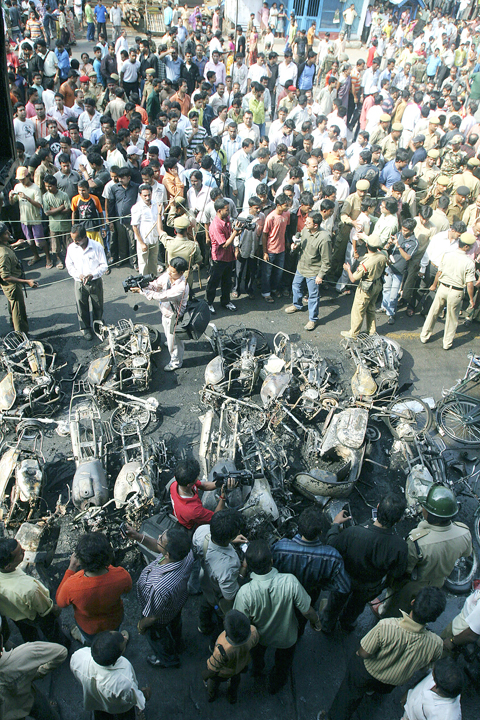Three critically injured people died overnight in hospitals, raising the death toll to 10 from three explosive attacks that hit India’s restive northeastern state of Assam, police said yesterday.
Another 59 people were injured in coordinated attacks on Monday, a day before an election campaign visit to the state by India’s prime minister, said Bhaskar Mahanta, an inspector-general of state police.
A spokeswoman for Singh’s office, Deepak Sandhu, said the prime minister’s trip, planned for later yesterday, had not been canceled.

PHOTO: AP
G.M. Srivastava, the state’s top police officer, blamed separatist United Liberation Front of Asom (ULFA) for Monday’s explosions on the eve of the 30th anniversary of its founding. The ULFA has been linked to many acts of terrorism in Assam state and usually stages attacks around this time of year.
The ULFA wants an independent state for ethnic Assamese and is the largest among dozens of militant groups in the region.
“This is a coordinated attack” by the group, Srivastava told reporters.
The head of Assam state said yesterday it was difficult to act against the insurgents as many of them operated from bases in neighboring Bangladesh and Myanmar.
“The Indian Government has taken up the matter with the new government in Bangladesh as well as the military leadership in Myanmar,” state Chief Minister Tarun Gogoi said.
India accuses Bangladesh of giving refuge to militants who are fighting separatist wars in its northeast. Bangladesh denies the charge.
On Monday, the first bomb was likely tied to a motorbike and exploded in a crowded market in the state capital, Gauhati, killing seven people and wounding at least 56, Srivastava said.
The blast left several cars on fire amid piles of smoldering wreckage.
Hours later, a second bomb, this one tied to a bicycle, went off in a market in the town of Dhekiajuli, 210km north of Gauhati, Srivastava said. At least four people were wounded, he said.
Later in the day, suspected militants threw a grenade at a police station in the town of Mankachar on the India-Bangladesh border, local police official Bhartha Mahanta said. Two police officers were injured, one of them critically, Mahanta said.
Srivastava said police had recently received information that the front had been planning a major attack in Gauhati.
The separatists accuse the government of exploiting the area’s natural resources while doing little for the indigenous people — most of whom are ethnically closer to peoples in Myanmar and China than to the rest of India.
More than 10,000 people have died in separatist violence over the past decade.
In related news, an irate journalist threw a shoe at India’s home minister yesterday in an echo of the attack on then-US president George W. Bush in a press conference in Iraq last December.
P. Chidambaram ducked as the trainer flew past him, but remained calm and smiled broadly as the man was escorted out of the event in New Delhi.
The Sikh journalist was angered by the minister’s response to a question related to the alleged involvement of ruling Congress party officials in 1984 anti-Sikh riots that left thousands dead.

POLITICAL PATRIARCHS: Recent clashes between Thailand and Cambodia are driven by an escalating feud between rival political families, analysts say The dispute over Thailand and Cambodia’s contested border, which dates back more than a century to disagreements over colonial-era maps, has broken into conflict before. However, the most recent clashes, which erupted on Thursday, have been fueled by another factor: a bitter feud between two powerful political patriarchs. Cambodian Senate President and former prime minister Hun Sen, 72, and former Thai prime minister Thaksin Shinawatra, 76, were once such close friends that they reportedly called one another brothers. Hun Sen has, over the years, supported Thaksin’s family during their long-running power struggle with Thailand’s military. Thaksin and his sister Yingluck stayed

Kemal Ozdemir looked up at the bare peaks of Mount Cilo in Turkey’s Kurdish majority southeast. “There were glaciers 10 years ago,” he recalled under a cloudless sky. A mountain guide for 15 years, Ozdemir then turned toward the torrent carrying dozens of blocks of ice below a slope covered with grass and rocks — a sign of glacier loss being exacerbated by global warming. “You can see that there are quite a few pieces of glacier in the water right now ... the reason why the waterfalls flow lushly actually shows us how fast the ice is melting,” he said.

FOREST SITE: A rescue helicopter spotted the burning fuselage of the plane in a forested area, with rescue personnel saying they saw no evidence of survivors A passenger plane carrying nearly 50 people crashed yesterday in a remote spot in Russia’s far eastern region of Amur, with no immediate signs of survivors, authorities said. The aircraft, a twin-propeller Antonov-24 operated by Angara Airlines, was headed to the town of Tynda from the city of Blagoveshchensk when it disappeared from radar at about 1pm. A rescue helicopter later spotted the burning fuselage of the plane on a forested mountain slope about 16km from Tynda. Videos published by Russian investigators showed what appeared to be columns of smoke billowing from the wreckage of the plane in a dense, forested area. Rescuers in

‘ARBITRARY’ CASE: Former DR Congo president Joseph Kabila has maintained his innocence and called the country’s courts an instrument of oppression Former Democratic Republic of the Congo (DR Congo) president Joseph Kabila went on trial in absentia on Friday on charges including treason over alleged support for Rwanda-backed militants, an AFP reporter at the court said. Kabila, who has lived outside the DR Congo for two years, stands accused at a military court of plotting to overthrow the government of Congolese President Felix Tshisekedi — a charge that could yield a death sentence. He also faces charges including homicide, torture and rape linked to the anti-government force M23, the charge sheet said. Other charges include “taking part in an insurrection movement,” “crime against the